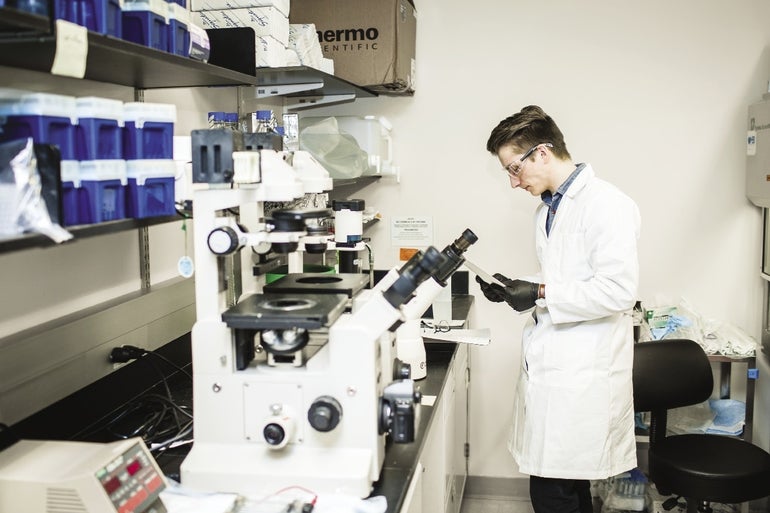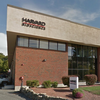Central Mass startup industry trying to make up for financing deficits
Back in 2002, while working in a research and development laboratory for global biopharmaceutical company Pfizer, Paul Wengender noticed his employer was contracting out certain drug discovery services.
Large pharmaceutical companies seemed to be looking to buy their custom DNA, proteins and cell lines they needed to use as biological tools as part of the drug discovery process from smaller contract research organizations, instead of making them in-house.
Wengender realized there was a business opportunity, and in 2003 founded Worcester contract research firm Blue Sky BioServices.
When it came time to look for funding, however, he realized the venture capital community didn't seem interested in Blue Sky because it didn't present enough of the high-risk, high-reward value proposition venture capitalists were usually interested in.
Plus, they only needed $1 million, which is not a lot of money for an investor. The company ended up raising just over $1 million from a group of high net worth individuals akin to angel investors.
“We didn't have a drug discovery scheme or a strategy of our own, and we didn't have a unique technology platform that was a value add for the market either. We were a straight 'lab down the hall' service company with intellectual assets and pharma-grade expertise that could be leveraged to help research-based drug discovery,” he said.
It's a common refrain for a startup company in Central Massachusetts. While resources in the area exist to house startups and connect them with industry partners who can help them grow both organizationally and financially, Worcester is not a huge venture capital magnet, according to several people in the area who work closely with startup companies.
Local startup groups work to make Worcester a center for innovation, so companies will stay in the area as they grow.
The allure of metro Boston
Last year, just over $6 billion was invested in 397 venture capital deals in Massachusetts, according to PricewaterhouseCoopers/CB Insights MoneyTree Report. The amount invested represents a 9-percent decrease in funding from 2015, but a 63-percent increase from total funding in 2012.
Almost 94 percent of funding went into deals in the Boston metro region, according to the report.
Usually when a company is first starting out, the founders raise money on their own from a network of friends and family. If they reach a point where they've exhausted those resources, but are able to move on to the next level, then it might be time to enlist the help of an angel investor, or a high net worth individual who's usually interested in helping the company grow in addition to making money, said Joe Vignaly, a member of Westborough angel investor group Boynton Angels and chairman of the Worcester Venture Forum, a network for technology startups and investors.
Once the local support network has been exhausted, it's time for a company to find a more serious source of capital. That can mean money from a VC firm, or a bigger company in the same field, like a Johnson & Johnson, can acquire the technology without acquiring the company, said James C. Donnelly, a lawyer at Mirick O'Connell, who is also a member of Boynton Angels.
It's good for Worcester when great ideas are imagined here, said Donnelly, but the challenge can be getting them to stay once they reach that funding stage, or when they reach breakout stage – like when they've achieved U.S. Food & Drug Administration approval or another big milestone.
Creating an innovation culture
Worcester may not be a big VC magnet, but there is infrastructure here to help entrepreneurs grow their ideas into companies. Through events at the Venture Forum, which spring out of Worcester Polytechnic Institute, students usually get their first taste of entrepreneurship outside the walls of their school, although events are open to all ages. Every year, the Venture Forum sponsors a pitch contest, where entrepreneurs present their companies in front of several judges for a cash prize.
There are also incubator spaces in Central Massachusetts – like the Worcester CleanTech Incubator, TechSandBox in Hopkinton and Massachusetts Biomedical Initiatives – that help companies grow. Most companies within MBI come out of industry, not academia, said President and CEO Kevin O'Sullivan.
“I tell people coming right out of college, 'You know what you need to do: go get a job in that industry and spend three to five years learning the market.' If you do, you're going to come out with a much better opportunity for success,” said O'Sullivan.
WPI has a Tech Advisors Network, where student, faculty, staff and alumni entrepreneurs can get advice from other WPI people who have experience in entrepreneurship.
“For all of its strengths, notwithstanding the fact that many do recognize Worcester as a center for innovation, it isn't yet recognized to the extent that it should be,” said Donnelly. “Its light is still somewhat under a bushel.”
Reversing the early flight trend
The trend was a Worcester company would get to a certain point of growth, see that there weren't enough opportunities here for them to grow, and then move closer to Boston, Vignaly said. That will change as the infrastructure grows, he said.
At the Worcester CleanTech Incubator, Executive Director Joe Bush said he has hosted a couple of venture capitalists in his incubator space since it opened last year.
“It's my job to line up as many potentially interesting meetings with this person as possible,” he said. “If we reach into the network in this area and coordinate schedules, I haven't seen any hesitation on the part of investors.”
Appealing to VCs
Bush said one of the reasons there hasn't been more venture capital activity in Central Massachusetts is that many of the companies here are in the earlier stages and seeking less money than VCs typically give out – as was the case with Blue Sky. Usually, VCs are looking to spend more money than Worcester companies have traditionally looked for, said Donnelly.
“[VCs] have to spend a lot of time and effort on due diligence, whether it's a large or small amount of money,” he said.
A private equity group eventually bought the majority of Blue Sky in 2011. Five years later, the company was acquired by California-based LakePharma, which is looking to expand its Worcester presence.
Wengender left Blue Sky in 2014, and served on the board until the Lake Pharma acquisition.
He said Worcester is and should be a place for drug discovery – not just contract research.
















0 Comments